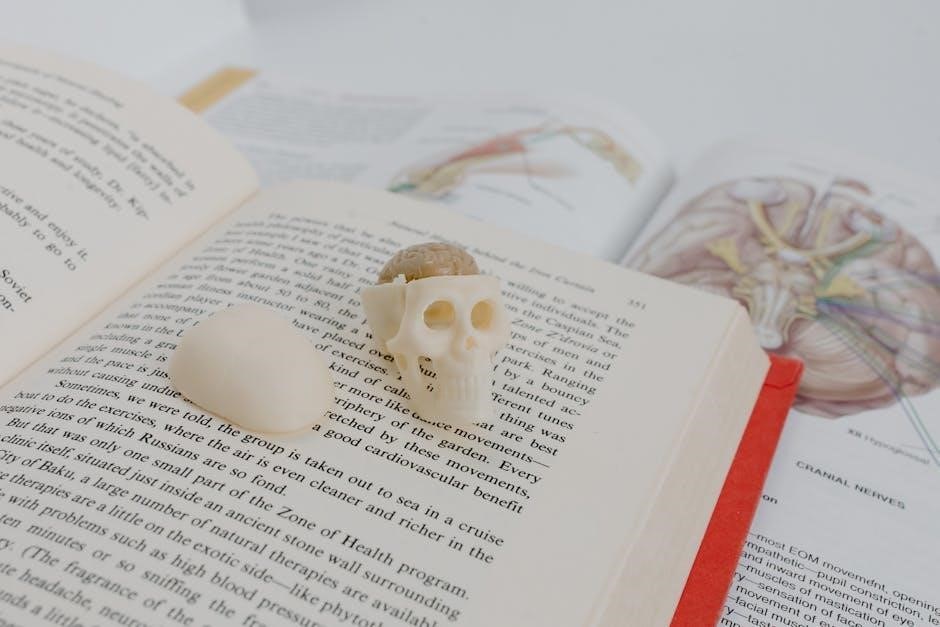
Time Management Strategies for Nursing Students
Effective time management is crucial for nursing students to balance academics and clinical training. Create a structured schedule, prioritizing tasks and setting realistic goals. Use the Pomodoro Technique (25 minutes study, 5 minutes break) to maintain focus. Allocate specific times for studying, attending classes, and clinical rotations. Regularly review and adjust your plan to ensure efficiency and avoid burnout. Incorporate short breaks to recharge and maintain productivity throughout the day.
- Prioritize tasks using to-do lists and planners.
- Dedicate specific blocks of time for focused studying.
- Utilize downtime for quick reviews or practice questions.
- Consistency is key to maintaining a balanced routine.
1.1 Effective Scheduling Techniques
Effective scheduling is a cornerstone of time management for nursing students. Start by creating a detailed weekly calendar, allocating specific time blocks for studying, attending classes, and clinical rotations. Use time-blocking to dedicate focused periods to complex topics, ensuring uninterrupted learning. Prioritize tasks based on urgency and importance, and break them into manageable chunks. Incorporate regular breaks to avoid burnout and maintain cognitive function. Utilize digital or physical planners to stay organized and track progress. Consistency is key; stick to your schedule but remain flexible to adapt to unexpected demands. Regularly review and adjust your plan to optimize productivity and reduce stress.
- Allocate specific times for focused study sessions.
- Use time-blocking for complex topics.
- Incorporate regular breaks to maintain focus.
- Track progress and adjust schedules as needed.
1.2 Balancing Study and Personal Time
Balancing study and personal time is essential for nursing students to maintain well-being and academic success. Set clear boundaries by designating specific hours for studying and personal activities. Schedule downtime for relaxation, exercise, and connecting with loved ones to prevent burnout. Use weekends or days off to recharge and engage in hobbies. Incorporate short breaks between study sessions to refresh your mind. Prioritize self-care activities, such as getting enough sleep and eating a balanced diet, to sustain energy levels. By maintaining a healthy work-life balance, you can stay motivated and perform better in both academic and clinical settings.
- Set clear boundaries between study and personal time.
- Use downtime for relaxation and self-care.
- Incorporate physical activity to maintain energy levels.
- Prioritize sleep and nutrition for optimal performance.
Understanding Your Learning Style
Identifying your learning style is key to effective studying. Nursing students can be visual, auditory, or hands-on learners. Understanding your style helps tailor study methods, like using videos for visual learners or attending lectures for auditory ones. This approach enhances retention and simplifies complex concepts, making studying more efficient and enjoyable.
2.1 Identifying Your Learning Preferences
Identifying your learning preferences is essential for optimizing your study routine. Nursing students typically fall into three categories: visual, auditory, or kinesthetic learners. Visual learners benefit from diagrams, videos, and slides, while auditory learners thrive through lectures, podcasts, and discussions. Kinesthetic learners prefer hands-on experiences, such as simulations or lab work. Reflect on your academic experiences to determine which method resonates most with you. Experiment with different techniques to identify what works best. Understanding your learning style allows you to tailor your study methods, enhancing retention and making complex concepts easier to grasp.
- Visual learners: Use diagrams, videos, and slides.
- Auditory learners: Engage in lectures, podcasts, and group discussions.
- Kinesthetic learners: Participate in simulations, labs, and hands-on activities.
2.2 Adapting Study Methods to Your Style
Once you identify your learning style, tailor your study methods to maximize effectiveness. Visual learners can benefit from color-coded notes, mind maps, and watching educational videos. Auditory learners should attend lectures, join study groups, and use voice memos for key concepts. Kinesthetic learners excel with hands-on activities, such as simulations, lab practice, and interactive workshops. Incorporate your preferred learning style into daily routines, using tools like flashcards for visual learners or podcasts for auditory learners. Experiment with different techniques to find what works best for you, ensuring a personalized and efficient study experience.
- Visual: Use diagrams, highlighters, and visual aids.
- Auditory: Engage in discussions, listen to podcasts, and attend lectures.
- Kinesthetic: Participate in simulations, labs, and hands-on activities.

Active Learning Techniques
Active learning engages nursing students through interactive methods like group discussions, simulations, and problem-solving exercises. These techniques enhance understanding, retention, and practical application of nursing concepts effectively.
3.1 Engaging in Interactive Study Methods
Interactive study methods, such as group discussions, role-playing, and case studies, actively involve nursing students in the learning process. These approaches encourage critical thinking and collaboration, enhancing retention of complex concepts. Simulations and hands-on activities bridge theory and practice, preparing students for real-world scenarios. Utilizing digital tools, like educational apps and virtual labs, further enriches learning experiences. Participating in study groups fosters peer-to-peer teaching, while problem-solving exercises sharpen clinical reasoning. Engaging in these methods not only deepens understanding but also builds confidence and teamwork skills essential for a nursing career.
3.2 Utilizing Nursing Study Guides
Nursing study guides are indispensable tools for students, offering structured content tailored to specific subjects and exams. They typically include detailed notes, key terms, and practice questions, helping students identify and focus on weak areas. Many guides, such as those for pharmacology or NCLEX prep, provide real-world application examples, making complex concepts easier to grasp. Interactive elements like flashcards and quizzes enhance active learning. Additionally, study guides often cover clinical scenarios, enabling students to apply theoretical knowledge practically. Regular use of these resources ensures comprehensive preparation, boosts confidence, and improves performance in both exams and clinical settings.

The Importance of Self-Care
Self-care is essential for nursing students to maintain mental and physical well-being. It involves activities like exercise, meditation, and socializing to reduce stress and improve focus. A balanced lifestyle fosters resilience, enabling students to manage academic and clinical demands effectively.
- Ensure adequate sleep and nutrition for optimal energy.
- Engage in regular physical activity to relieve stress.
- Practice mindfulness or meditation to maintain mental health.
- Set boundaries to protect personal time and recharge.
4.1 Maintaining Mental Well-Being
Mental well-being is vital for nursing students to manage stress and thrive academically. Prioritize mindfulness practices, such as meditation or deep breathing, to reduce anxiety. Connecting with peers or mentors can provide emotional support and perspective. Regular self-care activities, like reading or hobbies, help recharge mental energy. Recognize signs of burnout, such as fatigue or decreased motivation, and seek professional help if needed. A healthy mindset fosters resilience, enabling students to handle the demands of nursing school effectively. By nurturing mental health, students can maintain focus, creativity, and overall well-being throughout their studies.
- Practice mindfulness or meditation daily.
- Stay connected with supportive friends or family.
- Engage in hobbies to unwind and recharge.
- Seek counseling if feeling overwhelmed.
4.2 Prioritizing Physical Health
Physical health is essential for nursing students to maintain energy and focus. Regular exercise, such as walking or yoga, helps reduce stress and improve overall well-being. Eating a balanced diet rich in fruits, vegetables, and lean proteins supports brain function and stamina. Ensuring 7-8 hours of quality sleep each night is critical for cognitive performance and emotional stability. Staying hydrated and avoiding excessive caffeine or sugar prevents energy crashes. By prioritizing physical health, students can enhance their academic performance and resilience, enabling them to excel in both classroom and clinical settings.
- Incorporate daily physical activity for stress relief.
- Eat nutrient-dense meals to fuel the brain.
- Aim for 7-8 hours of quality sleep nightly.
- Limit sugary and caffeinated beverages.
Preparing for Nursing Exams
Mastering NCLEX practice questions and essential test-taking strategies is vital for nursing students. Daily practice with realistic questions improves critical thinking and time management during exams.
- Focus on high-priority topics covered in class.
- Use study guides and online resources for targeted preparation.
- Simulate exam conditions to build confidence and accuracy.
5.1 Mastering NCLEX Practice Questions
Mastering NCLEX practice questions is essential for nursing students to excel in their exams. Regular practice with realistic questions improves critical thinking, time management, and familiarity with exam formats; Focus on understanding rationales behind correct answers to deepen knowledge. Prioritize high-priority topics and simulate exam conditions to build confidence. Utilize online platforms and study guides for targeted preparation. Daily practice helps identify weak areas, allowing for focused revision. Consistent effort ensures readiness for the exam.
- Practice daily with a mix of question types.
- Analyze incorrect answers to avoid repeating mistakes.
- Use flashcards for quick concept reviews.
- Simulate exam conditions to improve accuracy.
5.2 Essential Test-Taking Strategies
Essential test-taking strategies are vital for nursing students to excel in exams. Start by carefully reading each question to understand what is being asked. Eliminate obviously incorrect answers first to increase chances of selecting the right one. Manage your time wisely, allocating a set amount to each question. Stay calm and avoid second-guessing your initial answers. If unsure, mark the question and return later. Use the process of elimination to narrow down choices. Review your answers at the end if time permits. Practice these strategies during NCLEX practice questions to build confidence and improve accuracy.
- Read questions thoroughly before answering.
- Eliminate incorrect options to increase accuracy.
- Manage time effectively during the exam.
- Stay calm and avoid overthinking.

Leveraging Nursing Resources
Leverage online platforms, study guides, and flashcards to enhance learning. Utilize nursing-specific apps and websites for quick revisions and interactive study methods. Join study groups and forums for peer support and shared knowledge.
6.1 Best Online Platforms for Nursing Students
Popular online platforms like NurseInTheMaking and MFocusReview.com offer comprehensive study resources, including flashcards and practice questions. These tools help nursing students master complex topics efficiently. Many platforms provide interactive learning materials, such as video tutorials and NCLEX-style quizzes, to reinforce understanding. Additionally, websites like Khan Academy and Coursera offer free courses on healthcare-related subjects. Utilizing these resources enables students to stay updated on the latest medical knowledge and techniques. They also foster a sense of community through forums and study groups, where students can collaborate and share insights. These platforms are invaluable for supplementing traditional coursework and clinical training.
- NurseInTheMaking
- MFocusReview.com
- Khan Academy
- Coursera
6.2 Building a Supportive Study Community
Creating a supportive study community is essential for nursing students to thrive academically and emotionally. Joining study groups or online forums connects students with peers who share similar goals and challenges. Platforms like NurseInTheMaking and Reddit communities provide spaces for collaboration, resource sharing, and mutual encouragement. Actively participating in these groups fosters accountability and collective growth. Additionally, engaging with online forums allows students to access advice from experienced nurses and educators. Building these relationships not only enhances learning but also prepares students for the collaborative nature of healthcare professionals. A strong support network can significantly reduce stress and improve overall academic performance.
- Join online forums and study groups.
- Engage with peers for shared resources and advice.
- Participate actively to foster accountability.
- Utilize digital tools for collaboration.